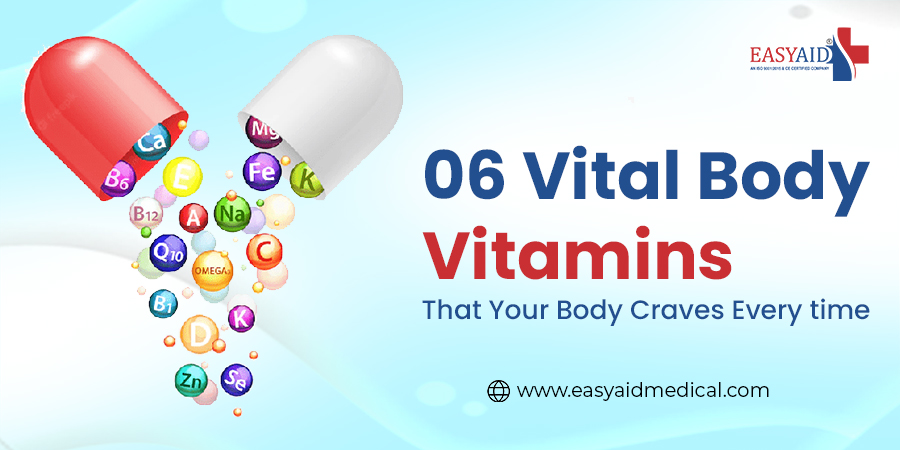06 Vital Body Vitamins That Your Body Craves Every time
Introduction
Vitamins are distinguished as key micronutrients which are essential in maintaining good health and wellbeing, providing functions for the body. From supporting internal body defenses to helping with needed growth or development, vitamins are critical to daily life. They are involved in numerous biochemical reactions serving as the catalysts, and helping with metabolism, energy production as well as tissue maintenance.
Every vitamin is a differentiator that works as an antioxidant (case of vitamin C), as a booster of bone strength (case of vitamin D), or as a contributor to vision (case of vitamin A. In a right, a person usually has a wide range of vitamins, but at times, supplements are needed to satisfy particular needs. In general, it is vital to be aware of the role of vitamins which reiterates the need for a balanced diet that includes serving of fruits, vegetables, grains, and other healthful foods for better health and long life.
Vitamin A: The Vision Enhancer

Vitamin A is a nutritional superstar especially when it comes to enhancing eye health since it is very important for vision. This fat-soluble vitamin works both ways fulfilling both the function of maintaining vision in the dark (night vision) and the health of the eye surface. Its precursors, such as beta-carotene in red, green, or orange-producing fruits and vegetables, transform vitamin A inside the body.
Vitamin A maintains the optimum activities of the photoreceptor cells in the retina which enables the conversion of light to nerve impulses that mean transmission of visual information to the brain. Besides, it also causes the formation of rhodopsin, a key pigment for vision in the dark. Vitamin A has many more functions including immunity, skin health, and cell growth and differentiation, besides improving vision.
Vitamin B Complex: The Energy Booster

Vitamins are the ones that play an important role in the energy metabolism of food. This group comprises B1 (thiamine), B2 (riboflavin) B3 (niacin), B5 (pantothenic acid), B6 (pyridoxine), B7 (biotin), B9 (folate) and B12 (cobalamin). Together these vitamins are referred to as vitamin B complex.
These vitamins participate in metabolism which act as catalysts in the extraction of energy from carbohydrates, fats, and proteins. As a result, they help in supporting the body’s energy production and utilization. They also play a role in the production of red blood cells and neurotransmitters. Vitamin B deficiency can cause tiredness, weakness, and reduced cognitive performance. Foods rich in vitamin B include whole grains, lean meat, dairy products, beans, leafy green vegetables, etc.
Vitamin C: The Immune Factor

Ascorbic acid, also known as vitamin C, is a water-soluble vitamin. This means that it needs to be taken every day with food or supplements because it is poorly stored and dissolves in water to reach the body’s tissues. Vitamin C is a potent antioxidant that can scavenge dangerous free radicals and aid in the healing of wounds and illnesses.
Collagen is a fibrous protein found in connective tissue that is intricately woven across the body’s many systems, including the circulatory, neurological, and bone. In the brain and nerves, the vitamin aids in the production of several hormones and chemical messengers. Vitamin C plays a very important role in boosting the body’s immune system. So, it can help prevent various diseases.
Vitamin D: The Bone Builder

We can get vitamin D from food or from the hormones that our bodies produce. It is a fat-soluble vitamin that has long been recognized for aiding in the body’s absorption and retention of phosphorus and calcium. These two elements are essential to bone formation. Adionally, vitamin D can lessen inflammation, assist regulate infections, and slow the growth of cancer cells. Scientists are currently exploring additional potential applications for this vitamin.
Though some foods are fortified with vitamins, few foods naturally contain vitamin D. It is difficult to get enough vitamin D from food, therefore for the majority of individuals, the best method to acquire enough is to take a supplement. Vitamin D can also be obtained with the help of sunlight.
Also Read – Unveiling the Science Behind Super Meals to Lose Weight
Vitamin E: The Anti-Oxidant Shield

Vitamin E is a necessary nutrient for healthy blood, brain, and skin as well as eyesight and reproduction.
Antioxidant properties are also present in vitamin E. Antioxidants are compounds that have the potential to shield your cells from the damaging effects of free radicals. Heart disease, cancer, and other illnesses may be influenced by free radicals.
If you take vitamin E for its antioxidant qualities, be aware that the advantages of the supplement may not match those of the antioxidants found naturally in food. Almonds, peanuts, canola oil, olive oil, margarine, and peanuts are foods high in vitamin E. Additionally, dairy, leafy greens, meats, and fortified cereals are good sources of vitamin E. Nerve discomfort may result from a vitamin E deficiency.
Vitamin K: The Clotting Factor

Blood clotting requires the presence of vitamin K, also known as the clotting factor. This fat-soluble vitamin facilitates the synthesis of several proteins involved in the clotting cascade, which is essential for wound healing.
Vitamin K also plays a role in maintaining bone health by regulating calcium deposition in bone tissues and by preventing calcification of blood vessels. Vitamin K is found in adequate quantities in many leafy greens such as kale, spinach, and broccoli and some fermented foods like cheese. These sources can be easily obtained from trustworthy digital pharmacies. Thus every online pharmacy assures the comfort and availability necessary for maintaining one’s health and well-being.
Conclusion
Overall, vitamins are greatly appreciated for maintaining general wellness and productivity. Ranging from vitamin A, critical for good vision, to vitamin K which is responsible for blood clotting, each vitamin performs specific functions that are critical for the body. A sufficient amount of vitamins either from a balanced diet rich in nutrient-dense foods or through supplementation are the key to preventing deficiencies and health conditions associated with it.
There have never been any obstacles regarding access to vitamin-rich foods and supplements that can be bought through pharmacies founded on high principles, so that people may take care of their health and life more easily today than ever. Vitamins are the key to optimum health. Thus, living a full and fulfilling life is possible is possible with the help of vitamins.


